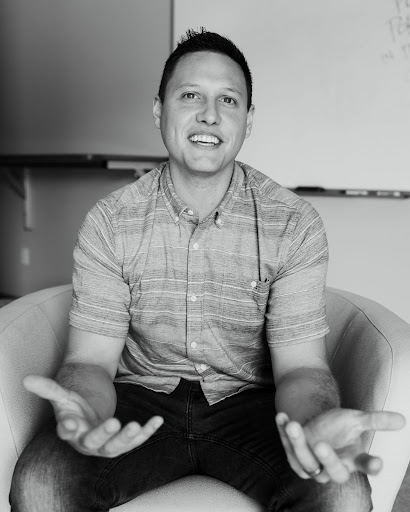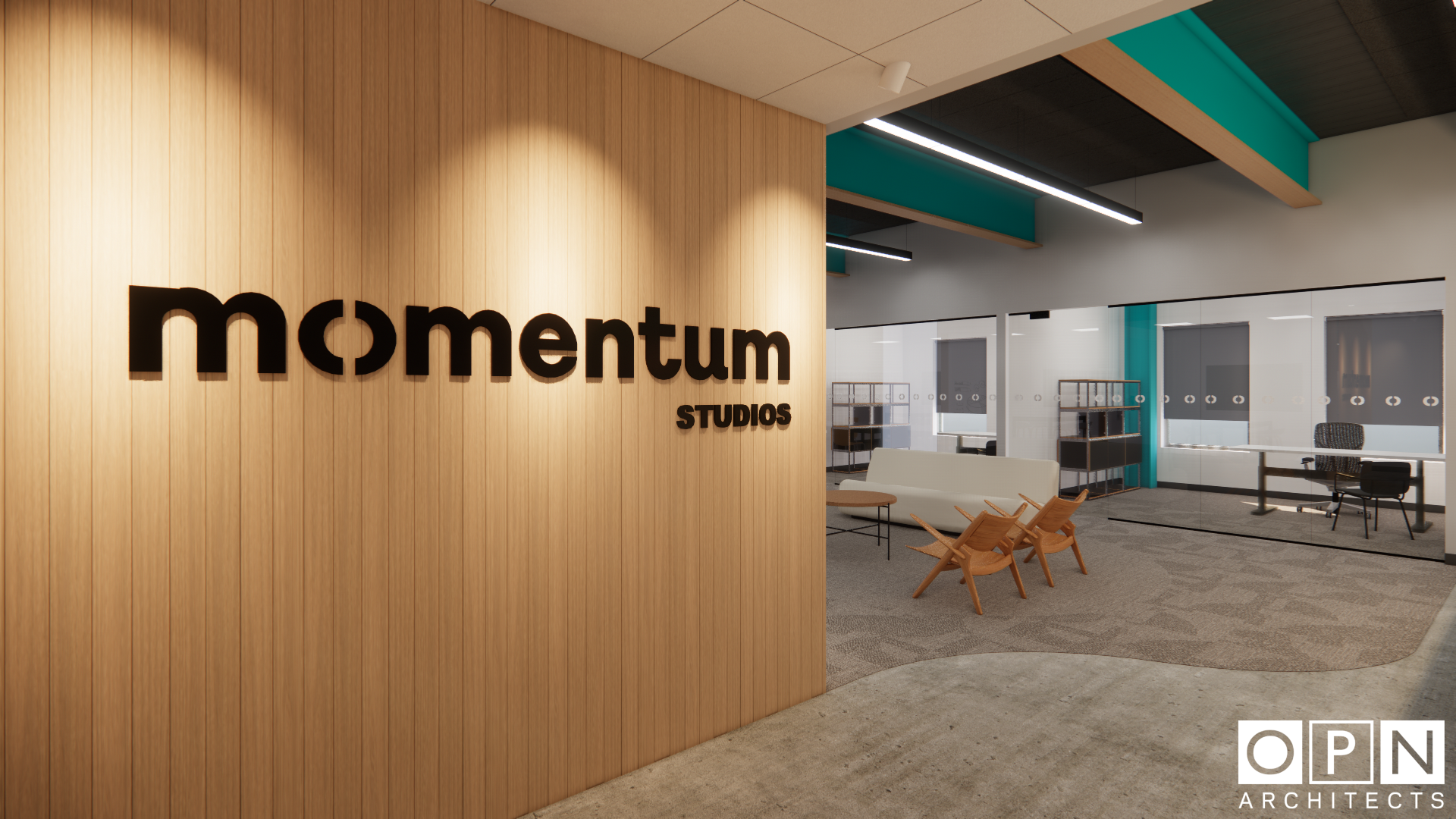The founder and CEO says he hopes to create a ‘movement’ of organizations meeting complex challenges with a curious, innovative mindset

Jeff Reed’s entrepreneurial journey started almost six years ago when he left his job to start his first consulting company, the Elevate Co. Since then, he’s been evolving and developing his own vision for innovation consulting through a few different ventures.
Starting the Elevate Co. after several one-off projects on the side showed him what he could accomplish, he said.
“I think it was being involved in the communities and seeing just the impact that I can have with them. Having a background in franchises, customer experience, getting to travel and see a lot of things, [I thought] how could I apply those scalable and applicable skills to other people’s organizations?” Reed told the Business Record.
While working from Ankeny coworking space and coffee shop Blue Bean, Reed said he serendipitously met owner Carlos Rojas, a relationship that developed into the co-founding of Bizlab, an innovation and strategy consultant for startups, large corporate companies, the public sector and social impact enterprises.
After more than three years, Reed said both he and Rojas were heading in new directions as they looked to the future and their goals.
“We continued to grow and develop, and his own concept of Blue Bean has taken off,” he said. “Priorities have just shifted a little bit for both of us, so we decided to, as most business partnerships, I think, just go do our own things. I think in the lifecycle of being an entrepreneur, you understand that there’s beginnings and ends.”
Now, Reed has stepped out on his own with Momentum Studios, which he founded in May 2023, focused again on consulting for startups and larger companies as well as social impact organizations.
He said ultimately he wants this venture to be a movement to shift businesses’ perspectives on how they can approach challenges with a mindset of curiosity and problem solving.
Reed shares more about starting Momentum Studios below. His responses have been lightly edited for clarity.
Tell me about your vision for Momentum Studios. Is it different from your focus at Bizlab?
I think the vision is different. [Momentum Studios is] really something that I’ve founded, so I think the vision is just a little bit different in how I can see it and what I want to do. One of the fun projects that I’m engaged in is working with a man named Nave. He’s part of the Washington Mandela group that was here. I got connected to him through the ecosystem, and he’s actually wanting to build an entrepreneur ecosystem in Guinea, so we’ve been applying for grants. We talk maybe two or three times a week, and I think maybe by founding something by myself, it allows me to know that I can do those things but not feel pressure of if this doesn’t specifically align with all the leadership right now. Maybe it grows into that and it evolves, but it’s fun to be able to navigate those things or welcome those things.
When you say priorities shifted, what priority was moving to the forefront for you?
I think social impact work is just a natural draw for me. I think, honestly, it may not be as business focused, but some of it’s just personal season or life. I have two young kids that are 4 and 6 (years old). Carlos has got one that started in college this year and has another one that’s a couple of years away from graduating. But also I think him having an additional concept of what Blue Bean is and wanting to focus on that as well and still consult. There’s just so many irons in the fire because entrepreneurs are crazy and they just want to do everything and all of it. I think that’s probably what drove some of it.
How have your first two experiences starting companies helped you with Momentum Studios?
It’s talked about a lot, but your network is your net worth. I spent time before I ever quit my job really building community and relationships in the metro. And when I quit, they didn’t care where I worked, they still just came along with with me. It’s really pushed my perspective around how meaningful those relationships are, and they don’t really care what the business name is, it’s who it is. They’re buying the relationship just as much as they are the service.
I think that that’s been something that again, kind of starting over and doing it again, it’s a fear that I don’t have it all because you just kind of know those people will come along, so much so that we’re about six months in and I still don’t even have a business card. It’s a priority. But it’s not one that makes or breaks business like maybe a first-time entrepreneur would think. It’s a sense of accomplishment to have your name printed on a business card and your logo, but it’s something I don’t have. There’s just those traditional things that I haven’t put in place because do I think it will help sales and do I think it’ll help exposure? Absolutely. But do I see the value of actually having conversations, connecting with people, [having] authentic experiences? That has gotten it further. I think that’s definitely learning through the process of having confidence in the network and trusting it.
I’d say the other is just believing in your expertise and what that’s worth. Not coming from [a career in] a consulting company, finding the value that your knowledge is worth is definitely a process and it takes a long time to get there.
How do you frame the value and expertise that you and Momentum Studios offer?
I always say I’m very privileged and honored to be at the spot that I get to be at the intersection of all types of challenges. That’s a large organization, a startup, that could be a true nonprofit challenge that they have. But what’s really cool is that most of those, no matter the category or type of business, they all have the same challenges. It’s just about the scale on which that challenge is, but it’s really cool to see, “OK, well, this startup has a solution,” or maybe they don’t even have a solution. Maybe they have something that failed but it could work in the nonprofit space amazingly. Getting to be able to pull from all the different exposures. I think having that ability or agility is really priceless from the fact that not many people have that. It goes back to that analogous concept of if you’ve only been in insurance, and you stay in insurance, and you do insurance, there’s nothing to take away from that. You’re probably really good and an expertise in insurance. I choose to be and have an expertise in problem-solving, and that kind of doesn’t see those bounds, but it’s really cool to be able to mix and match those or draw from different things.
What role do you think that problem-solving mindset has to play in helping businesses address their challenges?
It’s a paradigm we talk about a lot. So large companies want what small companies have, and that’s speed and agility, but small companies want what big companies have, and that’s usually process and structure. One thing it’s allowed us to do is not allow that to get out of balance when we engage in one of those verticals because if a startup said, “Hey, we need process, structure, all of this,” we could go all in, and if we didn’t have the perspective of those large organizations of what overstructuring something could do, then we would overstructure a startup and they would then lose their agility. It allows us to understand the strength they have as far as being a startup and having agility, but then it allows for them to maintain it when we add in those things that they want. That’s where I see a lot of the value in it. I think just in the ecosystem, there are more companies that need support, and there are more challenges, and the world is getting more complex than it ever has been that there will never be enough people doing this work to solve those challenges. At the end of the day, as the world progresses — we talked a little bit about AI — there are becoming less and less creators and more and more just users, so to actually be able to stand out and be a creator of things I think will be a really big advantage as a human, as a business to not necessarily be consuming. I’d like to be on that side of the future. I’d like to help create it, not necessarily just be consuming what other people create.
What are you hearing about businesses’ current relationships with AI? In what ways will Momentum Studios consult on and engage with AI challenges?
For larger organizations, I see it from the compliance side. How do we actually use this and monitor it? Some of the conversations I’ve had is how do leaders inside of an organization oversee how work is getting done and know if it is AI driven or not? A lot of our conversations I think are not necessarily around how do I manage it because there again, they’re not necessarily the perfect fit because they just want to manage something. Those who want to harness it, those conversations are more around how do I find those tasks in the organization that can be automated so we can reduce staffing around something or can we maintain our staffing level, but can we grow because now we don’t need someone truly taking notes? We talked about how can we leverage AI to allow team members to find more fulfillment in the work that they do? Can it take out those tasks that give you that brain drain, things that could save a lot of time and effort that can be converted in other places for the organization? That’s usually what our conversations are about.
What are your hopes for growing Momentum Studios?
I think [the hope] would be bringing people along on the journey of innovation, specifically in the Midwest, just because we’re a slow adopter. I think that’s part of it. What I get real excited about are national or global opportunities to create impact with aspiring entrepreneurs with different companies, seeing projects with the fun companies happen with Converse like working with Chuck Taylors. They have an innovation lab, which most people wouldn’t think about. As of right now, we have a unique structure of internal team members, but also 12 consultants that are part of the team. So continue to grow the team but grow the team through the lens of expertise, but that’s not the main driver. When I meet with someone who wants to be a consultant, I ask all the questions, and I always come back to it’s just good people doing good work, so [it’s about] them being bought into that and understanding what that means. Instead of being a company at the end of the day, what I would really strive to be is truly a movement of how things are done and empowerment and changing perspectives. That would be where I’d love to go. It’d be the true north I’m aiming for.
